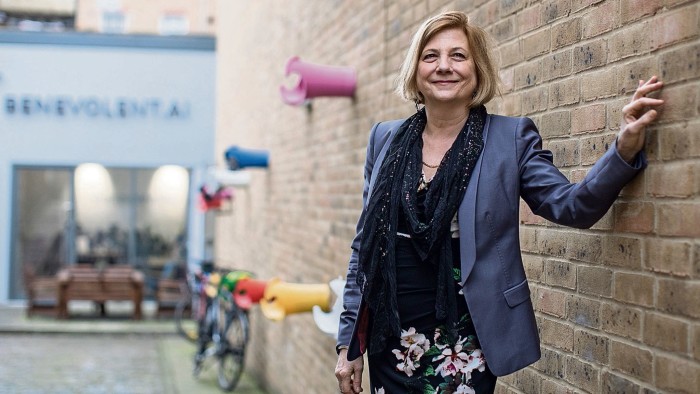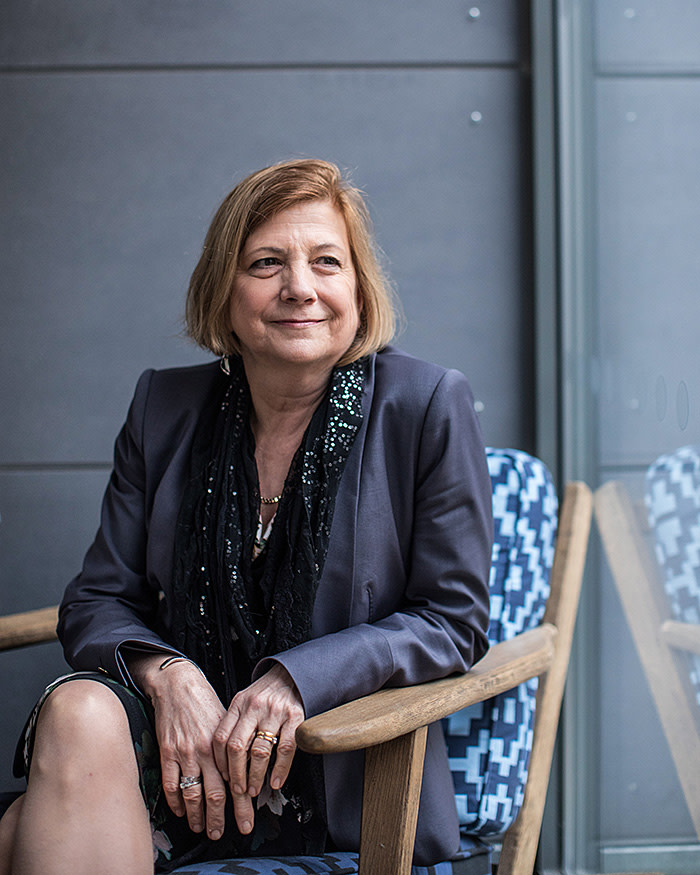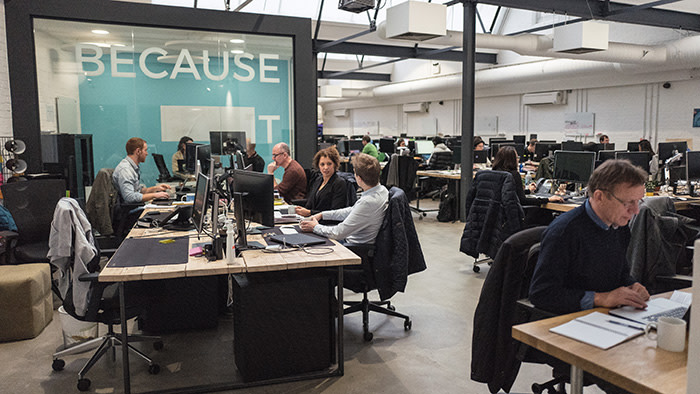AI startup boss Jackie Hunter upends pharma and male tech culture

Roula Khalaf, Editor of the FT, selects her favourite stories in this weekly newsletter.
Jackie Hunter jumps out of her seat and commands the press officer to stand up so she can demonstrate how “the fist-bump” — a typically male congratulatory gesture — is not conducive to women joining tech start-ups. “I asked a male colleague the other day ‘how would you feel if I did this to you?’” she explains, presenting her fist. “He looked very uncomfortable.”
Surrounded by mostly younger male colleagues in a typical start-up office consisting of rows of computers, the 61-year-old is chief executive of BenevolentBio, which uses artificial intelligence to sift through medical research to help scientists find treatments for untreated diseases.
Professor Hunter has made a habit of “calling out those behaviours, no matter how trivial” on the grounds that “it’s those little things that make a big difference”. This is her way of attempting to help speed up cultural change in the male-dominated tech industry. She is adamant that women must consider careers in technology because the field “is going to transform the way we do so many different things”.
In her previous role running the UK’s Biotechnology and Biological Sciences Research Council, Prof Hunter became very interested in the analysis and curation of big data. So it was “a logical next step” to join the biotech subsidiary of BenevolentAI, a group founded in 2013 by Ken Mulvany, a serial entrepreneur. She had worked for him before, as a non-executive director at Proximagen, a biotech company Mr Mulvany sold to drugmaker Smith Upsher in 2012.
A career scientist, Prof Hunter is in charge of applying BenevolentAI’s technology to drug research and development. With a 3 per cent average return on investment, the way big pharma “does things now is not sustainable” says Prof Hunter, who spent two decades hunting for new drugs at GSK, the pharmaceutical company.
Most of the $2bn-$2.5bn cost of bringing a new drug to market is “the cost of failure”, she says. “I was lucky to work on a few compounds that succeeded but 90 per cent of what starts [in the industry] fails.” The blockbuster model — whereby a few star-performing medicines yielded most of the profits — is “gone”, she says.
Does that mean scandal-hit Valeant had a point in buying up pharma companies, stripping out their costly R&D operations and hiking medicine prices? “It was a very bad reaction to the same problem,” Prof Hunter says. “Jacking up prices was exploitative not innovative.”

BenevolentBio wants to cut the cost and increase the success rate of drug discovery. It is focusing on untreated diseases with small patient populations. “There are 8,000 diseases that are not treated,” says Prof Hunter, whose eyes sparkle as she makes big gestures with her arms to demonstrate the scope of her ambition. “There’s a huge opportunity if we pick the right target and if we use . . . AI because a human brain can’t compute all the evidence.”
All relevant studies and data are fed into BenevolentBio’s computers. Scientists analyse and sort the most promising hypotheses thrown up by the platform. When BenevolentBio is able to establish that a new compound can treat a disease, its next step will be to form a partnership with a pharmaceutical company to commercialise the discovery. A poster by the company’s main entrance opposite London’s Euston station describes the discovery of a compound with the potential to cure motor neurone disease. It is now working to develop this with a specialist research institute in Sheffield.
Another BenevolentBio target is glioblastoma, the brain cancer with “a 5 per cent survival rate” afflicting former minister Tessa Jowell.
BenevolentAI, which has received £87m in venture funding so far, plans to raise more money before it is likely to report a profit. The company expects to generate revenues by licensing research findings, ranging from early chemical leads to drug candidates at various stages of clinical or pre-clinical development.
What is to stop incumbent pharma companies from simply copying the upstart’s methods? “They are all expressing an interest in AI,” Prof Hunter says. “The challenge is that having set up an organisation in a particular way, getting it to change the way it does things will need real commitment from the top.” She herself has found working for a tech-based start-up a sometimes “uncomfortable” change from drug discovery at a multinational.
Like many start-ups, BenevolentAI has cross-functional teams — with two-weekly sprints, cycles, demonstrations — that might include an engineer, an AI person, user interface person, a chemist, a biologist, a data scientist all working together on a particular problem. Feeling uncomfortable is good, she adds, “because it means you are doing things differently”.
Working with a youthful team means their enthusiasm and lack of preconceptions “rub off on you”, Prof Hunter chuckles. There are benefits both ways, she adds. “What can I contribute? An ability to ask the right questions, have a different point of view, and challenge the way of doing things.”
If BenevolentBio stands to disrupt Big Pharma, does the start-up itself face a threat from Big Tech? A case in point was Facebook’s poaching in January of Jerôme Pesenti, chief executive of BenevolentTech, the group’s tech division, to head the social media group’s work in artificial intelligence. Prof Hunter however remains sanguine. “I might have been worried if he were going to Amazon,” she says, speaking a couple of weeks after Amazon announced a move into healthcare. “That is why we are not resting on our laurels. We are continuing to evolve our technology every day. We have an advantage in having entered this area four or five years ago.”
A more immediate threat is Brexit. “There is no doubt that European academics are thinking of leaving or not coming to the UK because of uncertainty over whether EU nationals can work here after Brexit,” she says. “I think the government needs to come out very strongly and make clear that EU personnel will be welcome here. We as a country rely on recruiting the best scientists. Science is going to drive economic growth whether it is in AI or bioscience. If we cannot recruit the best, our science will suffer. “
Advice: Jackie Hunter on how to attract more women to the technology sector

• National governments need an explicit policy to attract more women into technology from school to university and beyond. Initiatives by individual companies will not be enough to ensure a pipeline of younger women coming into the industry. Currently just 28 per cent of technology workers in the UK are female, but the statistics for girls studying computer science are even more concerning: girls account for less than 10 per cent of students completing a computing course at A-level.
• Although there has been a push to recruit more women to company boards, there is a need for start-ups and the venture capital community to do more. Women still make up only a very small percentage of the senior partners at tech-focused venture capital firms, which can have a chilling effect on female founders seeking funding.
• A critical mass of women is needed to change the ecosystem. Non-profit organisations can play a role in this. Astia in Silicon Valley, for example, is bringing together entrepreneurs, investors and advisers dedicated to helping high-growth female-led start-ups succeed.
• Call out behaviours that exclude women ‘no matter how trivial’. Changing the masculine culture of technology companies is a slow process, but women, particularly if they are in leadership positions, can help speed the process,
• Women in the technology industry should seek sponsors, who will “be advocates for you”. Ms Hunter points out that sponsoring a woman can also be a good learning opportunity for sponsors to understand the obstacles standing in the way of women in tech.

Comments